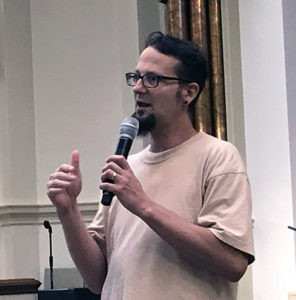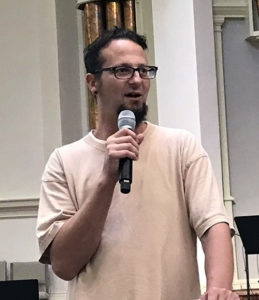WACO—Christians who support capital punishment shortchange God’s redemptive power, activist Shane Claiborne told a Waco crowd.
The Bible records the story of imperfect people—including murderers like Moses and King David—redeemed by a perfect God, he insisted.
“If we believe murderers are beyond redemption, we can rip out half of the Bible,” Claiborne told the No Need Among You Conference at First Baptist Church in Waco, sponsored by the Texas Christian Community Development Network.

The Old Testament principle of “an eye for an eye” that set a limit on retaliation to stop an escalating cycle of violence was “a good start,” but Jesus set a higher standard, he asserted.
‘Take evil seriously without mirroring it’
“We can take evil seriously without mirroring it. We don’t rape people who rape to show that rape is wrong,” Claiborne said. Likewise, he insisted, it makes no sense to kill people who kill to show that killing is wrong.
“We can protect society from dangerous people without killing them,” he said.
Ironically, 85 percent of the executions carried out in the United States happen in the Bible Belt, and conservatives who trust government least are most supportive of giving fallible government power over life and death through capital punishment, he said.
“The death penalty wouldn’t stand a chance if it weren’t for Christians. … The Bible Belt is the Death Belt in America,” he said.
Claiborne also linked support for the death penalty to racism, noting “the states that held onto slavery longest continue to hold onto the death penalty.”
Sign up for our weekly edition and get all our headlines in your inbox on Thursdays

Rather than seeking retribution, Claiborne called Christians to seek restorative justice that asks where wounds were inflicted and how they can be healed.
“Allow our imaginations to believe in redemption, even when it seems impossible,” he said.
Connect the gospel to the streets
In a related breakout session scheduled in conjunction with his keynote address, Claiborne urged Christians to develop relationships that put a human face on social issues.
“We don’t wait for politicians in D.C. to tell us how to treat the immigrant. We read the word of God,” he said. “Immigration is not an issue we debate. Immigrants are neighbors that we love.”
He also challenged Christians to look for creative ways to “raise the volume” to expose injustice and advocate for those whose voices are silenced.
“The gospel has to connect to the streets,” he said.
For instance, in response to the “epidemic of violence” in the United States, he and colleagues joined an effort to illustrate the prophet Isaiah’s vision of beating swords into plowshares. They allowed mothers whose sons had been killed to beat guns on an anvil and, with the help of a blacksmith, turn them into gardening tools.
On Good Friday, he and members of his Philadelphia neighborhood held an outdoor worship service, praying at the Stations of the Cross—each set up on a street corner where individuals had been killed.
One woman whose son had been killed on the streets of Philadelphia tearfully told Claiborne after the service: “I get it. I know what the gospel means now. God understands. He lost a Son, too.”















We seek to connect God’s story and God’s people around the world. To learn more about God’s story, click here.
Send comments and feedback to Eric Black, our editor. For comments to be published, please specify “letter to the editor.” Maximum length for publication is 300 words.